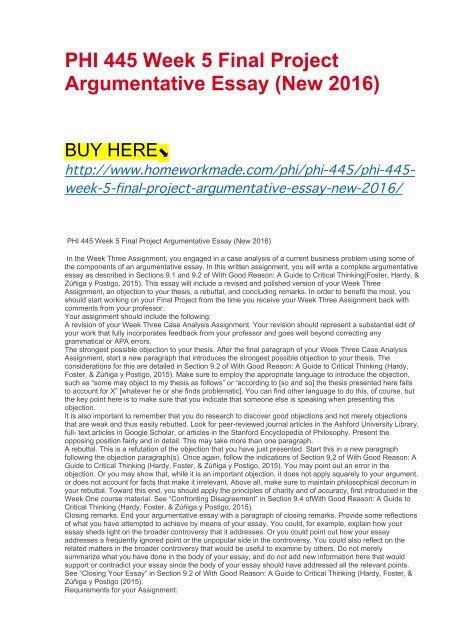PHI 445 Week 5 Final Project Argumentative Essay (New 2016)
Create successful ePaper yourself
Turn your PDF publications into a flip-book with our unique Google optimized e-Paper software.
<strong>PHI</strong> <strong>445</strong> <strong>Week</strong> 5 <strong>Final</strong> <strong>Project</strong><br />
<strong>Argumentative</strong> <strong>Essay</strong> (<strong>New</strong> <strong>2016</strong>)<br />
BUY HERE⬊<br />
http://www.homeworkmade.com/phi/phi-<strong>445</strong>/phi-<strong>445</strong>-<br />
week-5-final-project-argumentative-essay-new-<strong>2016</strong>/<br />
<strong>PHI</strong> <strong>445</strong> <strong>Week</strong> 5 <strong>Final</strong> <strong>Project</strong> <strong>Argumentative</strong> <strong>Essay</strong> (<strong>New</strong> <strong>2016</strong>)<br />
In the <strong>Week</strong> Three Assignment, you engaged in a case analysis of a current business problem using some of<br />
the components of an argumentative essay. In this written assignment, you will write a complete argumentative<br />
essay as described in Sections 9.1 and 9.2 of With Good Reason: A Guide to Critical Thinking(Foster, Hardy, &<br />
Zuniga y Postigo, 2015). This essay will include a revised and polished version of your <strong>Week</strong> Three<br />
Assignment, an objection to your thesis, a rebuttal, and concluding remarks. In order to benefit the most, you<br />
should start working on your <strong>Final</strong> <strong>Project</strong> from the time you receive your <strong>Week</strong> Three Assignment back with<br />
comments from your professor.<br />
Your assignment should include the following:<br />
A revision of your <strong>Week</strong> Three Case Analysis Assignment. Your revision should represent a substantial edit of<br />
your work that fully incorporates feedback from your professor and goes well beyond correcting any<br />
grammatical or APA errors.<br />
The strongest possible objection to your thesis. After the final paragraph of your <strong>Week</strong> Three Case Analysis<br />
Assignment, start a new paragraph that introduces the strongest possible objection to your thesis. The<br />
considerations for this are detailed in Section 9.2 of With Good Reason: A Guide to Critical Thinking (Hardy,<br />
Foster, & Zuniga y Postigo, 2015). Make sure to employ the appropriate language to introduce the objection,<br />
such as “some may object to my thesis as follows” or “according to [so and so] the thesis presented here fails<br />
to account for X” [whatever he or she finds problematic]. You can find other language to do this, of course, but<br />
the key point here is to make sure that you indicate that someone else is speaking when presenting this<br />
objection.<br />
It is also important to remember that you do research to discover good objections and not merely objections<br />
that are weak and thus easily rebutted. Look for peer-reviewed journal articles in the Ashford University Library,<br />
full- text articles in Google Scholar, or articles in the Stanford Encyclopedia of Philosophy. Present the<br />
opposing position fairly and in detail. This may take more than one paragraph.<br />
A rebuttal. This is a refutation of the objection that you have just presented. Start this in a new paragraph<br />
following the objection paragraph(s). Once again, follow the indications of Section 9.2 of With Good Reason: A<br />
Guide to Critical Thinking (Hardy, Foster, & Zuniga y Postigo, 2015). You may point out an error in the<br />
objection. Or you may show that, while it is an important objection, it does not apply squarely to your argument,<br />
or does not account for facts that make it irrelevant. Above all, make sure to maintain philosophical decorum in<br />
your rebuttal. Toward this end, you should apply the principles of charity and of accuracy, first introduced in the<br />
<strong>Week</strong> One course material. See “Confronting Disagreement” in Section 9.4 ofWith Good Reason: A Guide to<br />
Critical Thinking (Hardy, Foster, & Zuniga y Postigo, 2015).<br />
Closing remarks. End your argumentative essay with a paragraph of closing remarks. Provide some reflections<br />
of what you have attempted to achieve by means of your essay. You could, for example, explain how your<br />
essay sheds light on the broader controversy that it addresses. Or you could point out how your essay<br />
addresses a frequently ignored point or the unpopular side in the controversy. You could also reflect on the<br />
related matters in the broader controversy that would be useful to examine by others. Do not merely<br />
summarize what you have done in the body of your essay, and do not add new information here that would<br />
support or contradict your essay since the body of your essay should have addressed all the relevant points.<br />
See “Closing Your <strong>Essay</strong>” in Section 9.2 of With Good Reason: A Guide to Critical Thinking (Hardy, Foster, &<br />
Zuniga y Postigo (2015).<br />
Requirements for your Assignment:
Your assignment should be between 1500 to 1700 words in length, excluding the cover and references<br />
pages.<br />
Your examination should be both thorough and succinct. This is a combination that demands time and<br />
thought, so give yourself sufficient time to draft and revise.<br />
Your assignment should include citations, as well as a list of references. Both must be in APA form.<br />
Your references should include at least four peer-reviewed articles in addition to those that you will<br />
be carrying over from our <strong>Week</strong> Three Case Analysis Assignment. These references should be drawn<br />
from the Ashford University Library, Google Scholar, or the Stanford Encyclopedia of Philosophy.<br />
Your assignment should be submitted no later than the end of Monday (midnight, U.S. Mountain<br />
time).

















